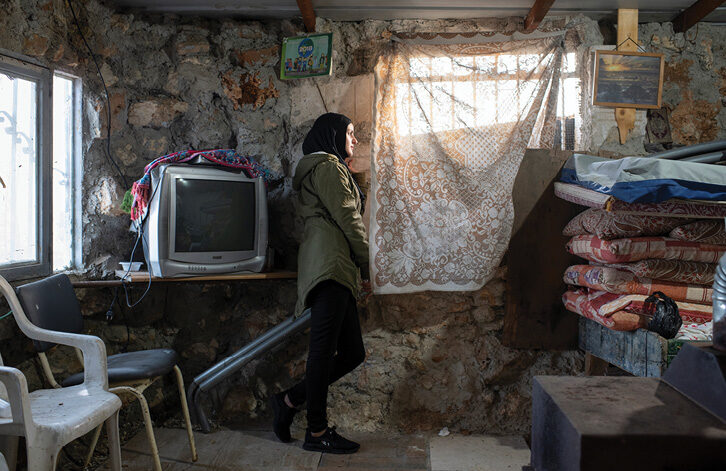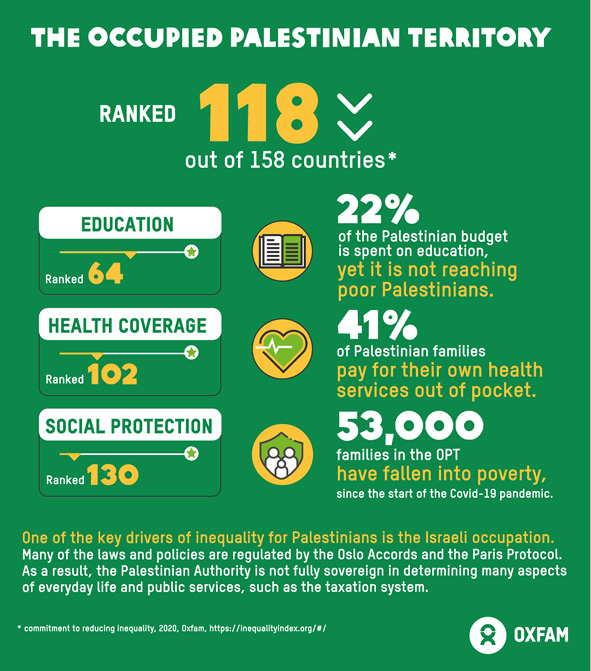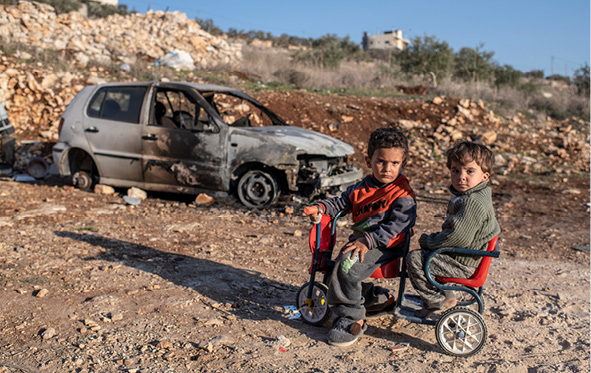In the Occupied Palestinian Territory (oPt), the level of inequality, the gap between the rich and the poor, dramatically increased in 2019. Globally, the OPT now ranks 118th out of the 158 countries assessed on the commitment-to-reduce-inequality index, a significant fall of 33 places compared to the 2018 placement – and alarming given the expressed commitment to reduce the inequality.
Weak policies exacerbate inequality in the oPt
Since 2019, the Palestinian Authority (PA) has experienced an escalating financial crisis that is due to the reduction in support from international donor governments, a drop in the safety budgetary aid from Arab countries, and the cessation of repayment of customs revenue from the Government of Israel. Since March 2020, the PA’s ability to support the Palestinian people has been put under even more pressure with the COVID-19 pandemic. PA policies that in 2019 already had driven the rise in inequality, especially in terms of basic social services and taxation, were not ready to sufficiently deal with the impact of the novel coronavirus pandemic.

The lack of robust policies and practices has played a significant role regarding the impact of the pandemic on societies around the world. Pre-COVID-19, only 16 percent of countries assessed for the CRI Index 2020 were spending enough on health care, and only 30 percent of the global workforce had adequate social protection. These weak policies and insufficient allocation of resources has meant that COVID-19 has exacerbated global inequality. The OPT was one of the countries that were hit the hardest by COVID-19, greatly affecting not only the health and education sectors but also the socioeconomic status of its citizens.
Extreme poverty vs. extreme wealth: How large is the inequality gap?
New analysis by Oxfam and Development Finance International (DFI) ranked 158 governments across the world based on their commitment to reduce inequality (CRI). This third edition of the CRI Index report recommends that all governments adopt strong anti-inequality policies regarding public services (health, education, and social protection), taxation, and labor rights to radically reduce the gap between the rich and the poor.*1
The pandemic is causing a financial burden on the PA and increases pressure on households. As its economic impact seeps through all levels of society, the most vulnerable families have borne the brunt. Another 53,000 Palestinian families have fallen into povertyv due to weak social protection measures, while those with the means at their disposal have survived relatively unscathed. As 41 percent of Palestinians have to pay for their own health care,*6 23 percent of households that needed health care services during the pandemic were unable to access them because they could not afford to pay for them.*7
The pandemic put immense pressure on the already struggling Palestinian economy that is expected to contract by at least 7.6 percent in 2020.*8
As a consequence, the PA’s local tax revenues will drop sharply, while the PA officially rejects accepting tax revenues owed by the Government of Israel, as the latter has unilaterally decided to make deductions. This extra financial pressure on the PA has resulted in the failure to pay full wages to public servants, including doctors and teachers, from May 2020 to the date of publication of this article. The PA managed to pay full salaries to workers who earn 1,750 shekels or less and paid only 50 percent of the owed salaries to those who earn more.

Other factors have also contributed to the ailing economy and increased financial pressure at the household level, such as Israel’s tightening movement restrictions for workers between the OPT and Israel and the collapse of the tourism sector. This sector recorded losses of US$1.15
billion in the last 10 months, as revenues decreased by 68 percent in comparison to 2019.*9 As a consequence of all these interlinked factors, the income of 42 percent of Palestinian families was halved during the March-April 2020 lockdown period.*10 The Palestinian Central Bureau of Statistics stated that during the first lockdown, there was a 10 percent drop in employment rates while 52 percent of wage earners did not receive their salaries and 25 percent were given only partial salaries.*11 Moreover, young Palestinians have been disproportionately impacted, as the unemployment rate among youth increased to 42 percent.*12
To deal with the crisis, households in the West Bank and Gaza have adopted negative coping mechanisms as the overall impact on Palestinian families has been devastating. Since February 2020, at least 30 percent*13 of families in the West Bank have fallen below the poverty line, which is more than double the rate of 2017.*14 In Gaza, a staggering 64 percent of the families now live below the poverty line.*15 This has caused many households to adopt negative coping mechanisms. Over a quarter of the families in Gaza (26 percent) and more than a third in the West Bank (36 percent) are now consuming a lower quality of food compared to before the pandemic. Many families are borrowing money and receiving food from relatives or friends.*16 A clear variation can be observed in student participation in online education, as only 53 percent of Palestinian households with children between the ages of 6 and18 years participated in education during the lockdown, and 40 percent of the households evaluated the experience as “bad” and did not fulfill the desired tasks. Women, who are already severely underrepresented on the labor market, have been hit particularly hard by the lockdowns. They now earn less, save less, and are overrepresented in precarious jobs that lack income security.
Inequality is multidimensional.
Distribution of wealth: The world’s 2,153 billionaires constitute 0.000002 percent of the world’s population yet own more wealth than the 4.6 billion people who make up 60 percent of the planet’s population. Meanwhile, around 735 million people are still living in extreme poverty.*2
Wealth is undertaxed: The wealthy enjoy some of the lowest tax levels in decades. Worldwide, only four cents of every dollar of tax revenue comes from taxes on wealth.
Underfunded public services: Public services suffer from chronic underfunding or are being outsourced to private companies that exclude the poorest. Thus, 258 million children – 1 in every 5, will not be allowed to go to school.
Denied a longer life: Having money is a passport to better health and a longer life, whereas being poor all too often means more sickness and an earlier grave. People from poor communities can expect to die ten or twenty years earlier than people in wealthy areas.*3
Palestinian women and girls’ access to social, health, and economic rights and social-protection services is seriously hampered. The CRI showed that women’s rights in the OPT ranked 124th globally. During the pandemic, gender-based violence incidents increased by 18 percent in calls from women seeking support, and a 38 percent spike has been reported regarding incidents of abuse and domestic violence from partners.*17
Some sectors, however, have flourished during the pandemic, such as the leasing and insurance sectors. The number of leasing contracts increased by 46 percent, in real terms an increase of US$9 million over the three months from March to June, while the insurance sector’s net income increased by 106 percent over the same period.*18
Inequality is sexist:
Women make up the largest segment of the world’s poorest individuals. While women are more likely to be found in poorly paid and precarious employment, they support society through billions of hours of unpaid or underpaid care work, the value of which is estimated at US$10.8 trillion per year.*4
Recommendations
COVID-19 is a significant factor that drives global inequality and serves as a wake-up call for governments to rethink their policies. In the oPt, the people hope that the PA will follow suit and rethink the impact of its current strategies so that those Palestinian families who can least afford it must no longer shoulder the burden of poor policies that have done little to protect or allow them to prosper.
“Besides my daily teaching, I had to take on a second job in a sports center. I earned 50 shekels a day. Otherwise, I could not have afforded the transportation costs to the school. I did not want to let my students down.”
Ibrahim Sawafi, a teacher from Ithna
The Palestinian Authority must increase its spending on health care and social protection and ensure that a larger portion of social spending is received by the poor by improving transparency and accountability. Furthermore, it must increase its financial resources for social security and social service programs that benefit particularly the poor. This includes reallocating resources within the general budget and giving more support to public social services. In addition, the government must create, design, and fund programs that generate jobs for young women and men.

It must restructure the tax policy towards more progressiveness by focusing on direct tax revenues (income and wealth), notably imposing a net wealth tax and a tax on exceptional profit rather than indirect taxes (consumption taxes). The number of tax brackets must be increased to ensure improved social equity, and marginal tax rates must be raised for the personal income of high-income categories and investment activities (which yield large and rapid profits) while tax rates must be reduced for low incomes and SMEs. Thus, it is necessary to adopt a progressive income tax policy.
*1 “5 shocking facts about extreme global inequality and how to even it up,” OXFAM, 2020, available at https://www.oxfam.org/en/5-shocking-facts-about-extreme-global-inequality-and-how-even-it.
*2 “World’s billionaires have more wealth than 4.6 billion people,” Oxfam, 2020, available at https://www.oxfam.org/en/press-releases/worlds-billionaires-have-more-wealth-46-billion-people.
*3 “5 shocking facts,” Oxfam.
*4 “5 shocking facts,” Oxfam.
*5 “COVID-19 Emergency Situation Report 4 (7–13 April 2020),” OCHA, available at https://www.ochaopt.org/content/covid-19-emergency-situation-report-4.
*6 “Overview of Public Health in Palestine,” the Palestinian National Institute of Public Health, https://www.pniph.org/en/about/about-pniph.
*7 “Impact of COVID-19 Pandemic (Coronavirus) on the Socio-economic Conditions of Palestinian Households Survey” (March-May), 2020, Palestinian Central Bureau of Statistics (PCBS), available at http://www.pcbs.gov.ps/site/512/default.aspx?lang=en&ItemID=3825.
*8 “Palestinian Economy Struggles as Coronavirus Inflicts Losses,” World Bank, June 1, 2020, available at https://www.worldbank.org/en/news/press-release/2020/06/01/palestinian-economy-struggles-as-coronavirus-inflicts-losses.
*9 “Palestine: The losses of the tourism sector exceed one billion dollars due to Corona” [in Arabic], Al-Arabi Al-Gedid, September 27, 2020, available at https://bit.ly/33oePUG
*10 PCBS, “Impact of COVID-19.”
*11 “H.E. Dr. Ola Awad, president of Palestinian Central Bureau of Statistics (PCBS), highlights certain Key Statistical Indicators in Palestine for the year 2020 on the anniversary of World Statistics Day 20/10/2020,” PCBS, 2020, available at http://www.pcbs.gov.ps/site/512/default.aspx?lang=en&ItemID=3833.
*12 Palestine Youth Unemployment Rate, Trading Economics, 2020, available at https://tradingeconomics.com/palestine/youth-unemployment-rate.
*13 World Bank, “Palestinian Economy Struggles.”
*14 “Poverty Percentages Among Individuals in Palestine According to Monthly Consumption Patterns by Region, 2017,” PCBS, available at http://www.pcbs.gov.ps/Portals/_Rainbow/Documents/Levels%20of%20living_pov_2017_01e.htm.
*15 World Bank, “Palestinian Economy Struggles.”
*16 “COVID-19 Emergency Situation Report 21 (20 October–2 November 2020),” OCHA, available at https://www.ochaopt.org/content/covid-19-emergency-situation-report-21.
*17 121 Emergency Helpline Update {Factsheet #2}, SAWA, 2020, available at https://www.facebook.com/Sawa.Organization/posts/sawa-organization-121-emergency-helpline-update-factsheet-2-sawa_organization-sa/2979405392121386/.
*18 “Statistics,” Palestine Capital Market Authority, 2020, available at https://www.pcma.ps/portal/english/StudsAndPubs/Pages/InsSectData_Stat_2020.aspx.


